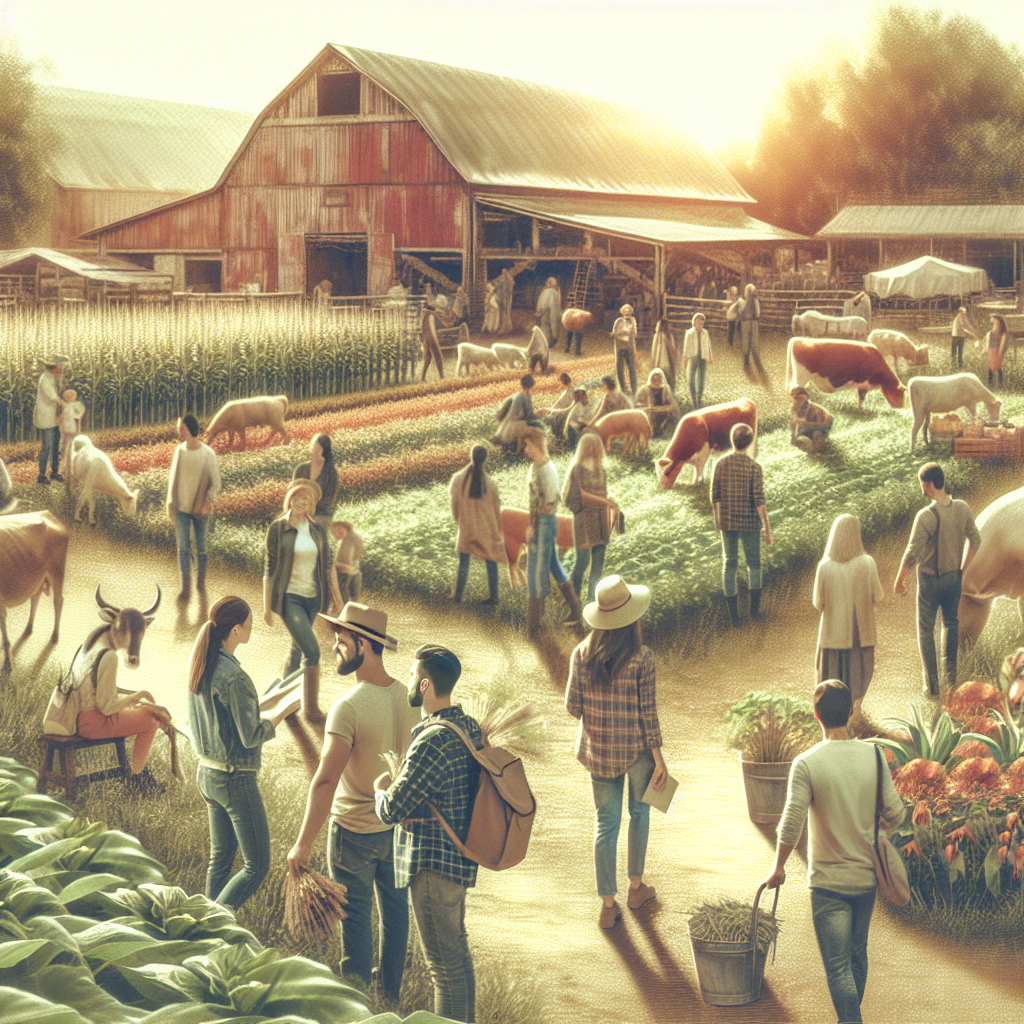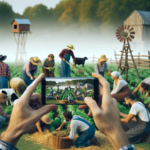Introduction To Agritourism Marketing
Welcome to our comprehensive guide on marketing in agritourism. From understanding the concept of agritourism, to the nitty-gritty of marketing strategies specifically tailored for this niche, this guide has you covered.
We’ll explore the significance of agritourism, unpack the art of marketing in this field, and provide useful marketing strategies that can help you connect with your audience in a more meaningful way.
Additionally, we will discuss the complexities of creating a successful agritourism experience and specific components that add authenticity and memorability to the farm experience.
Did you know that agritourism is a growing trend around the globe?
In the United States alone, agritourism revenues have more than tripled in the past decade.
With such immense growth, the importance of effective marketing strategies and customer-oriented farm experiences cannot be overstated.
So, are you ready to learn more about this interesting, lucrative sector?
Let’s get started!
Table of Contents
Understanding Marketing in Agritourism
What is Agritourism?
Agritourism is where agriculture meets tourism. It involves activities that bring visitors to a farm or ranch for the purpose of enjoyment, education, or active involvement in the farm’s operations. Common examples include:
- Farm stays
- U-pick operations
- Farm tours
- Wine tasting
- Harvest festivals
Purpose of Marketing in Agritourism
Marketing in agritourism aims to attract visitors, generate income, and foster a connection between producers and the public. Effective marketing strategies help farmers maximize their reach and profitability.
Key Marketing Strategies
Here are some essential marketing strategies for agritourism:
- Social Media Marketing: Platforms like Facebook, Instagram, and Twitter can showcase farm events and connect with potential visitors.
- Website Development: An informative and visually appealing website provides details about the farm, available activities, booking information, and contact options.
- Email Campaigns: Collecting emails from visitors allows you to send newsletters, promotions, and event announcements.
- Partnerships & Collaborations: Working with local businesses, tourism boards, and influencers can increase your visibility.
Creating a Marketing Plan
A marketing plan helps organize efforts and assess effectiveness. A typical plan should include:
| Component | Description |
|---|---|
| Target Audience | Identify who you want to visit your farm (families, school groups, tourists, etc.). |
| Value Proposition | Describe what sets your agritourism experience apart from others. |
| Marketing Channels | Determine which platforms (social media, local ads, etc.) you’ll use to reach your audience. |
| Budget | Allocate funds for different marketing activities and tools. |
| Metrics | Set metrics to evaluate the success of your marketing efforts (e.g., visitor numbers, online engagement). |
Utilizing Feedback and Reviews
Feedback and reviews play a significant role in marketing. Encourage visitors to leave reviews on platforms like Google and Yelp. Positive reviews boost credibility and attract new visitors. Responding to both positive and negative feedback shows that you value your customers.
For more detailed information on agritourism marketing strategies, you can visit this Agriculture.com article.
The Farm Experience
What is a Farm Experience?
A farm experience encapsulates the many activities and events involved in agritourism. It’s not just about simply visiting a farm; it’s about immersing oneself in the rural lifestyle and gaining a deeper appreciation of agriculture’s role in society. This can range from:
- Taking part in daily farm chores, such as feeding animals or milking cows.
- Learning about sustainable farming practices and experiencing the farm-to-table process.
- Interacting with the farmers and farm animals, providing a tactile means of learning.
- Enjoying the scenic beauty and peaceful ambience of the countryside.
- Participating in craft workshops, such as cheese making or bread baking.
Benefits of a Farm Experience
A farm experience offers numerous benefits to visitors, including:
- Educational Value: Visitors gain valuable insights into farming practices and where their food comes from.
- Relaxation and Recreation: The serene rural environment serves as a respite from urban stress and bustle, offering a unique recreational opportunity.
- Hands-On Experience: Active involvement in farm life provides a unique tactile and sensory process, particularly beneficial for children.
- Connection with Nature: Farm visits facilitate a deeper connection with nature and promote understanding of ecological balance.
Making the Farm Experience Memorable
Ensuring visitors have a memorable experience is key to successful agritourism. Here are some strategies:
- Interactive Activities: Let visitors get hands-on, whether it’s feeding the farm animals, planting seedlings, or milking a cow.
- Inspiring Workshops: Offer craft workshops, such as soap making, pottery, or canning jams and pickles.
- Guided Tours: Take visitors on an educational journey around the farm, sharing stories and interesting facts about the crops and animals.
- Comfortable Accommodation: Provide cozy, clean and comfortable accommodation for those interested in farm stays.
- Delicious Food: Serve authentic farm-to-table meals, featuring the farm’s fresh produce and homemade goods.
The Role of Authenticity in a Farm Experience
A key driver behind the appeal of a farm experience resides in its authenticity. Unlike many modern tourist attractions, farms represent genuine environments where work and life are closely intertwined. This authenticity has a significant influence on visitor satisfaction and their intention to revisit or recommend the farm to others.
Improving the Farm Experience
Updating your operational practices and continuously improving services is crucial in enhancing guest satisfaction and ensuring repeat visits. Doing this requires:
- Hosting regular staff training to ensure excellent customer service.
- Implementing customer feedback recommendations.
- Keeping up-to-date with technology, like online booking management systems.
- Maintaining farm hygiene and safety.
- Innovating and diversifying the farm experience regularly.
Challenges and solutions to improving the farm experience can be found in this study on Rural Tourism Experience.
The Concept of a Marketing Tour
Overview of a Marketing Tour in Agritourism
A marketing tour, in the context of agritourism, is an organized and guided tour designed specifically to highlight the unique aspects, offerings, and value propositions of a farm or a ranch to a targeted audience. This audience can range from travel agents, media personnel, influencers, or potential business partners who can help amplify the reach and appeal of the agritourism experience.
Importance of Marketing Tours
Marketing tours serve several critical purposes in the promotion of agritourism:
- Showcase Unique Features: They offer a firsthand experience of the farm’s daily operations, special events, and unique attractions, helping to differentiate it from competitors.
- Media Coverage: Inviting journalists and bloggers for a marketing tour can lead to press releases, articles, and social media posts, providing widespread visibility.
- Influencer Engagement: Engaging social media influencers can attract their followers to your farm, often resulting in increased visitor numbers.
- Building Partnerships: Marketing tours can attract potential business partners interested in collaborations, expanding your network of opportunities.
Key Components of a Successful Marketing Tour
To maximize the effectiveness of a marketing tour, consider including the following elements:
- Comprehensive Itinerary: Create a detailed schedule that includes a mix of activities such as farm tours, hands-on experiences, and time for Q&A sessions.
- Engaging Storytelling: Use storytelling to create a narrative around your farm, its history, and practices. Share compelling stories that resonate with the visitors.
- Professional Presentation: Ensure the farm is well-prepared, clean, and staff are knowledgeable and welcoming.
- Marketing Materials: Provide high-quality brochures, fact sheets, and promotional items with branding information that visitors can take with them.
- Follow-Up: After the tour, maintain communication with attendees to build and strengthen relationships.
Leveraging Technology in Marketing Tours
Integrating technology can enhance the effectiveness of your marketing tours:
- Virtual Tours: Utilize virtual reality or live streaming to provide an immersive experience for those who cannot attend in person.
- Social Media Live Coverage: Encourage live posting and real-time updates on platforms such as Instagram and Facebook during the tour.
- QR Codes: Place QR codes around the farm that link to additional information, videos, or special promotions.
The Importance of Farm Marketing Plans
What is a Farm Marketing Plan?
A farm marketing plan is a comprehensive strategy used by agricultural producers to identify and reach their desired market for their products or services. This plan typically includes market research, marketing tactics, budgeting, and performance metrics. It’s a vital tool for farmers to structure their marketing efforts, optimize resource use, and achieve financial goals.
Components of a Farm Marketing Plan
A robust farm marketing plan should cover several core components:
- Market Research: Analyze current market conditions, consumer behaviors, and industry trends to identify opportunities and challenges.
- Competitive Analysis: Evaluate competitors to understand their strengths, weaknesses, and strategies. Identify what makes your farm unique.
- Product Mix: Determine which products or services to offer and their unique selling points. This could include organic certifications, local fresh produce, or unique agritourism experiences.
- Pricing Strategy: Develop pricing policies that reflect the value of your products and ensure profitability, while remaining attractive to customers.
- Sales and Distribution Channels: Identify the best ways to reach your target audience, whether through direct sales at a farm market, online sales, partnerships with local restaurants, or agritourism events.
- Promotional Tactics: Craft a mix of strategies to promote your farm, such as social media advertising, email newsletters, public relations efforts, or local community events.
- Budget Allocation: Allocate resources effectively to different marketing activities, keeping track of expenditures and expected returns.
- Performance Metrics: Define key performance indicators (KPIs) to measure the success of your marketing plan, such as visitor rates, sales growth, or customer satisfaction.
Strategic Objectives for Farm Marketing Plans
To create an actionable farm marketing plan, set clear and achievable objectives that can guide your efforts. These might include:
- Increase Sales: Target a specific percentage increase in annual sales through enhanced marketing efforts.
- Customer Growth: Aim to expand your customer base by reaching new demographics through targeted advertising.
- Brand Awareness: Enhance the farm’s brand presence and recognition within the local or wider community.
- Market Expansion: Explore entering new markets, such as diversifying product lines or expanding agritourism offerings.
Digital Marketing Techniques for Farms
Digital marketing can significantly extend your farm’s reach and attract a varied audience. Key techniques include:
- Search Engine Optimization (SEO): Optimize your website content with relevant keywords to improve visibility on search engines.
- Content Marketing: Create valuable content like blog posts, videos, or infographics that tell your farm’s story and engage your audience.
- Online Advertising: Use Google Ads or social media ads to target potential customers based on their interests and behavior.
- Email Marketing: Develop segmented email lists to send customized newsletters and promotions, building a relationship with your audience.
Importance of Community Engagement
Building strong ties within the local community can be a powerful marketing tool:
- Local Partnerships: Collaborate with nearby businesses or institutions to cross-promote your services.
- Community Events: Host events such as farm-to-table dinners, educational workshops, or seasonal festivals to bring the community to your farm.
- Social Responsibility: Engage in community projects or charitable activities to build goodwill and enhance your farm’s reputation.
Wrapping Up
In conclusion, understanding the blend of agriculture and tourism dubbed as agritourism, and its inherent marketing strategies is important for any farmer intending to diversify income streams. Key marketing strategies include social media marketing, website development, email campaigns and forming strategic partnerships.
Moreover, creating an effective marketing plan is critical for success, setting out components such as target audience, the farm’s value proposition, choice of marketing channels, budget, and key metrics. In the modern age, utilizing client feedback and reviews for continuous improvement is also essential.
In addition, providing a rich ‘farm experience’, through interactive activities, inspiring workshops, guided tours, good accommodation, and delicious food, plays a vital role in ensuring the return and referral of visitors. The uniqueness and authenticity of the farm experience, coupled with continuous innovation and improvement, is the key to success in the long run.
Regular marketing tours can be a great way to showcase the unique aspects of the farm, get covered in media, engage influencers, and build partnerships. Lastly, it’s vital to have a thorough farm marketing plan, using digital marketing techniques, and engaging the community.
Frequently Asked Questions – FAQs
What is agritourism?
Agritourism is where agriculture meets tourism. It involves activities that bring visitors to a farm or ranch for enjoyment, education, or active involvement in the farm’s operations.
What are key marketing strategies for agritourism?
Key marketing strategies include social media marketing, website development, email campaigns, forming partnerships with local businesses, tourism boards, and influencers.
Why is it important to have a marketing plan in agritourism?
A marketing plan is important as it organizes marketing efforts, defines target audience, sets the value proposition, determines marketing channels, sets budget, and key metrics for success.
What is a farm experience?
A farm experience goes beyond just visiting a farm; it’s about immersing oneself in the rural lifestyle, participating in daily farm chores, learning about sustainable farming, enjoying the countryside, and participating in craft workshops.
What is a marketing tour in agritourism?
In agritourism, a marketing tour is an organized and guided tour designed to highlight the unique aspects and offerings of a farm or a ranch to a targeted audience like travel agents, media personnel, influencers, or potential business partners.
What is the role of digital marketing in agritourism?
Digital marketing can significantly broaden the reach of a farm to attract diverse audiences. It includes strategies like Search Engine Optimization (SEO), content marketing, online advertising, and email marketing.






